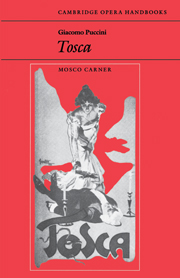Book contents
- Frontmatter
- General preface
- Contents
- List of illustrations
- 1 Sardou and his La Tosca
- 2 Naturalism in opera: verismo
- 3 Genesis of Tosca
- 4 Synopsis
- 5 Play and opera: a comparison
- 6 First production and critical history
- 7 Interpretation: some reflections
- 8 Style and technique
- 9 Musical and dramatic structure
- 10 Analysis: Act I in perspective
- 11 Tosca in the United States
- Notes
- Select bibliography
- Discography by Malcolm Walker
- Index
1 - Sardou and his La Tosca
Published online by Cambridge University Press: 04 August 2010
- Frontmatter
- General preface
- Contents
- List of illustrations
- 1 Sardou and his La Tosca
- 2 Naturalism in opera: verismo
- 3 Genesis of Tosca
- 4 Synopsis
- 5 Play and opera: a comparison
- 6 First production and critical history
- 7 Interpretation: some reflections
- 8 Style and technique
- 9 Musical and dramatic structure
- 10 Analysis: Act I in perspective
- 11 Tosca in the United States
- Notes
- Select bibliography
- Discography by Malcolm Walker
- Index
Summary
Victorien Sardou (1831–1908) is today scarcely more than a footnote to the history of late nineteenth-century French drama. Were it not for Puccini's opera, based on his play, Sardou's name would probably be known today only to students of French literature. Yet in his time he was a most successful playwright, generally recognized as a born man of the theatre who had all the tricks of his trade at his finger-tips. Modelling his technique on that of his more famous predecessor, Eugene Scribe, who may be said to have initiated what is nowadays called (with some contempt) the ‘well-made’ play, Sardou wrote a number of stage-works in this genre. An extremely well-thought-out plot, basically naturalistic and which unfolds with almost mathematical logic, stunning coups de théâtre, and a dialogue flexible, well-turned and often razor-sharp – these were the positive aspects of Sardou's dramas. Yet there was in them no profundity of thought and feeling, no spiritual, moral or social ‘message’, no poetry. Sardou's were boulevard dramas in which his supreme aim was to entertain – to entertain as a high-class thriller entertains, creating an atmosphere of mounting suspense and riveting the spectator's attention by means of sensational stagehappenings that were to their author of far greater importance than the exploration of a character's psychology. In a Sardou play, action dwarfs character which is, as it were, only one storey high. ‘Sardoodledom’ was the unflattering term that G. B. Shaw coined for this kind of play.
- Type
- Chapter
- Information
- Giacomo Puccini: Tosca , pp. 1 - 5Publisher: Cambridge University PressPrint publication year: 1985



